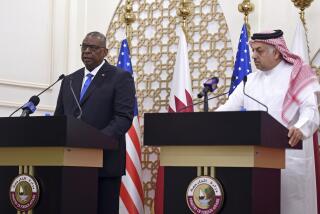U.S. admiral counsels patience with Pakistan
- Share via
WASHINGTON — Any future terrorist attack on the United States probably would originate in Pakistan’s western tribal regions, where Al Qaeda leaders have set up their most secure haven since the fall of the Taliban in Afghanistan, the top U.S. military officer said Tuesday.
But Adm. Michael G. Mullen, chairman of the Joint Chiefs of Staff, said action to forcibly disrupt the militants’ planning effort is unlikely for now. Difficulties faced by the new government in Islamabad, including a deteriorating economy, are forcing American and Pakistani leaders to wait before moving against extremists.
“I believe fundamentally if the United States is going to get hit, it’s going to come out of the planning that the leadership in the FATA is generating, their planning and direction,” said Mullen, referring to Pakistan’s Federally Administered Tribal Areas. “I’m not saying it is guaranteed it’s going to happen, or that it’s imminent. But clearly we know the planning is taking place.”
Mullen’s comments echoed the thinking among many military and intelligence officials, but represents one of the starkest assessments yet of the implications of Al Qaeda’s ability to reorganize in western Pakistan. Mullen last week visited the country’s troubled region along the Afghanistan border.
The Pashtun tribal regions have become the primary focus of worldwide U.S. counter- terrorism efforts amid intelligence reports that Al Qaeda has been able to regroup to levels not seen since the U.S. invasion of Afghanistan in late 2001.
Mullen’s visit, which included meetings with Pakistan’s new army chief, Gen. Ashfaq Kayani, was his third in just six months, but his first since the new Pakistani government took office in March. Mullen made his remarks during a breakfast meeting with military writers.
The new government has come under criticism for negotiating with extremist groups in the tribal areas, a policy that has been criticized as allowing Taliban and Al Qaeda fighters to regroup. The previous efforts, headed by President Pervez Musharraf, were widely blamed for the resurgence in violence in Afghanistan last year. Musharraf largely abandoned the approach under U.S. pressure.
Mullen said he shared the concerns of international military leaders in Afghanistan, including the outgoing NATO commander, U.S. Army Gen. Dan K. McNeill, that the renewed negotiations were allowing fighters to move more freely, crossing the border into Afghanistan. Mullen said he pressed Pakistani military leaders to take action to block cross-border attacks.
At the same time, he argued that negotiations with insurgent groups have borne fruit in other countries. He cited U.S. military talks with Sunni Arab extremists in western Iraq, where moderates were won over and violence plummeted. Because of that, he said, U.S. officials should remain patient as Pakistan engages Pashtun tribes in the west.
But Mullen acknowledged that, unlike in Iraq, failure to dismantle extremist groups in western Pakistan could have a direct bearing on whether Al Qaeda is able to strike the U.S.
“In the FATA, it’s that patience that runs you right up against that threat,” he said. “And that really defines the problem.”
Senior U.S. Defense officials have acknowledged a growing tension within the Pentagon over conditions in Pakistan. As increasingly urgent reports detail the reorganization of extremists within tribal regions, the Bush administration insists on giving the new government time to establish itself.
U.S. officials at times have exerted more pressure on Pakistani leaders, with mixed results. Musharraf’s perceived acquiescence to U.S. demands left him politically tarnished.
U.S. officials have consciously toned down their praise for Kayani, fearing their obvious support would hamper his ability to gather domestic support for a reinvigorated offensive against extremist leaders in the border regions.
Still, the U.S. has quietly been pushing for Pakistan to accept U.S. assistance in developing a counterinsurgency plan. As one of the first steps in that effort, Mullen said, the Pentagon expected to send 20 to 30 U.S. military trainers to Pakistan this summer.
Those teams would begin developing a cadre of Pakistani trainers who would, in turn, train members of the Frontier Corps, a ragtag militia group tasked with patrolling the tribal regions.
But Mullen acknowledged that such moves were unlikely to produce immediate results.
“The new government, quite frankly, is still struggling,” he said. “It’s going to take some time to get it. There is a thirst to solve this overnight. We’re just not going to solve it overnight.”
--
More to Read
Sign up for Essential California
The most important California stories and recommendations in your inbox every morning.
You may occasionally receive promotional content from the Los Angeles Times.













